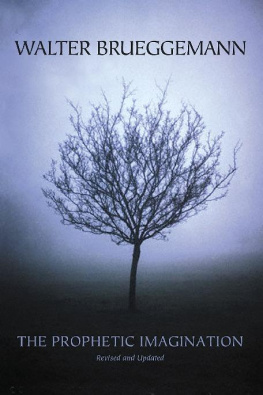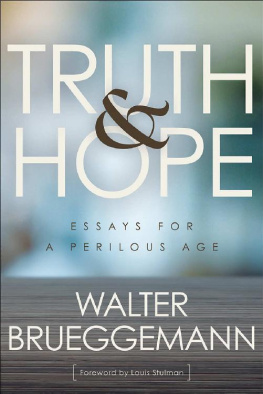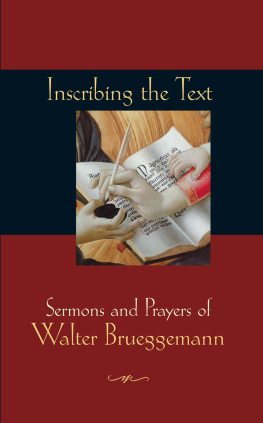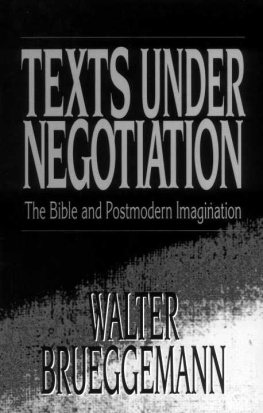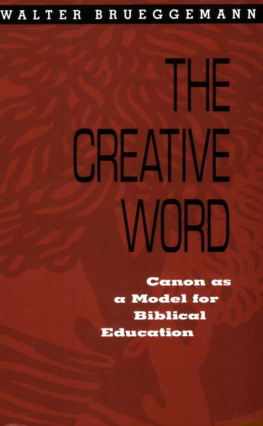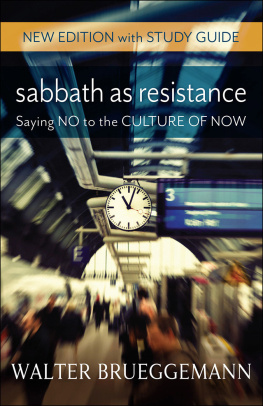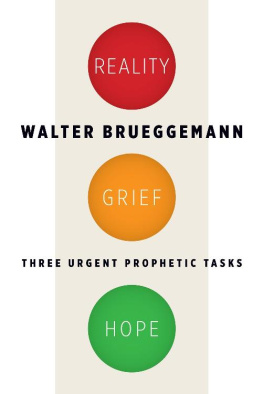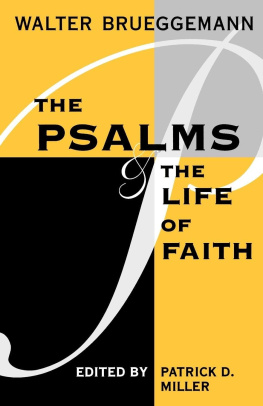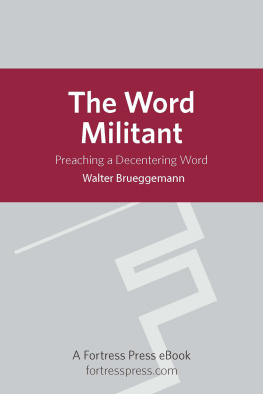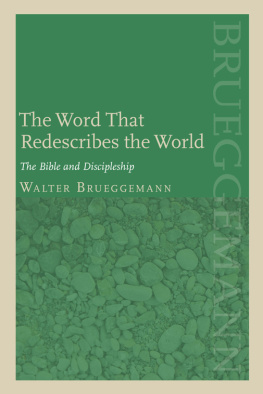Walter Brueggemann - The Prophetic Imagination
Here you can read online Walter Brueggemann - The Prophetic Imagination full text of the book (entire story) in english for free. Download pdf and epub, get meaning, cover and reviews about this ebook. year: 2001, publisher: Fortress Press, genre: Religion. Description of the work, (preface) as well as reviews are available. Best literature library LitArk.com created for fans of good reading and offers a wide selection of genres:
Romance novel
Science fiction
Adventure
Detective
Science
History
Home and family
Prose
Art
Politics
Computer
Non-fiction
Religion
Business
Children
Humor
Choose a favorite category and find really read worthwhile books. Enjoy immersion in the world of imagination, feel the emotions of the characters or learn something new for yourself, make an fascinating discovery.
- Book:The Prophetic Imagination
- Author:
- Publisher:Fortress Press
- Genre:
- Year:2001
- Rating:3 / 5
- Favourites:Add to favourites
- Your mark:
- 60
- 1
- 2
- 3
- 4
- 5
The Prophetic Imagination: summary, description and annotation
We offer to read an annotation, description, summary or preface (depends on what the author of the book "The Prophetic Imagination" wrote himself). If you haven't found the necessary information about the book — write in the comments, we will try to find it.
The Prophetic Imagination — read online for free the complete book (whole text) full work
Below is the text of the book, divided by pages. System saving the place of the last page read, allows you to conveniently read the book "The Prophetic Imagination" online for free, without having to search again every time where you left off. Put a bookmark, and you can go to the page where you finished reading at any time.
Font size:
Interval:
Bookmark:
THE PROPHETIC IMAGINATION
THE PROPHETIC IMAGINATION
Second Edition
WALTER BRUEGGEMANN
FORTRESS PRESS
Minneapolis
THE PROPHETIC IMAGINATION
Second Edition
Copyright 2001 Augsburg Fortress. All rights reserved. Except for brief quotations in critical articles or reviews, no part of this book may be reproduced in any manner without prior written permission from the publisher. Write: Permissions, Augsburg Fortress, Box 1209, Minneapolis, MN 55440-1209.
Biblical quotations are translated by the author.
Cover image: Photograph by Andreas Heumann. 2001 Tony Stone. Used by Permission.Cover design: David Meyer
Frontispiece: Door jamb figure of Jeremiah. St. Pierre, Moissac, France. 2001 Giraudon/Art Resource, NY. Used by permissionBook design: Ann Delgehausen
eISBN 9781451419702
Library of Congress Cataloging-in-Publication Data
Brueggemann, Walter
The prophetic imagination / Walter Brueggemann.2nd ed. p. cm. Includes bibliographical references (p. ) and index. ISBN 0-8006-3287-7 (alk. paper) 1. Prophets. 2. Pastoral theology. I. Title.BS1198 .B84 2001
221.15dc21
2001018929
For sisters in ministry
who teach me daily about
the power of grief
and
the gift of amazement
Contents
The publication of The Prophetic Imagination in 1978 was my first publication in which I more-or-less found my own voice as a teacher in the church. Much has changed for me since then, but the basic thesis that I articulated there holds for me and continues to frame my ongoing work. There are indeed definitive continuities between what I said then and what I would say now.
IAt the same time, a great deal has changed since then. I mark three such changes. First, the changes in method and approach in the critical study of the Bible since then are immense. In 1978 or in the years just preceding when I wrote, scripture study was completely defined by historical criticism, even though the first hints of new approaches were on the horizon. For the study of the prophetic texts, this commitment to historical criticism meant understanding the prophetic personalities in their presumed historical contexts and then extrapolating from that text-in-context to general thematics. Derivatively, the practical use of prophetic texts in prophetic ministry meant rather regularly direct, confrontational encounter with established power in the way Amos seemed to confront Amaziah (retrospect, seems somewhat simplistic did indeed fund and authorize bold and courageous ministries.
At that time, however, scripture study generally awaited the articulation of methods that moved beyond or underneath historical criticism of a conventional kind. Specifically, social-scientific criticism, stunningly introduced into Old Testament studies by Norman Gottwald in 1979the year after my bookopened the way to see texts as ideological statements evoked by and evoking specific forms of social action and policy, social authorization, and social criticism. The effect of such study is to situate prophetic texts more densely in the interplay of social forces that are in conflict over the correct characterization of social reality. Thus the texts are brought more closely into contact with the social processes in which they are imbedded and to which the texts themselves may have contributed.
In like manner, critical study of the Old Testament in 1978 still awaited the emergence of rhetorical criticism and its appreciation of the generative, constitutive power of imagination. In 1978, the same year as my book, Phyllis Trible published God and the Rhetoric of Sexuality, a definitive starting point in Old Testament study for the ways in which public speech (and thus text) generate alternative worlds.presumed, taken-for-granted worlds (the old liberal assumption). The canonical text, as norm for an intergenerational community, might also serve to nurture and fund obedience that is not necessarily confrontational but that simply acts out of a differently perceived, differently received, differently practiced world (imagination/obedience). Thus a focus on rhetoric as generative imagination has permitted prophetic texts to be heard and reuttered as offers of reality counter to dominant reality that characteristically enjoys institutional, hegemonic authority but is characteristically uncritical of itself.
The second change since 1978 that I note is my own changed perspective. My dedication of that book to sisters in ministry plus my citation of Jos Porfirio Miranda on page 89 indicate that at that time I was only beginning (as most of us were only beginning) to integrate into my interpretive practice the perspectives that are associated with various forms of liberation theology. My continued attention to issues of a liberation hermeneutic has since that time intensified for me. The recurring critiques of liberation hermeneutics are of course well known; in general, however, those critiques strike me as misinformed and offered by critics who have the luxury of social distance from the sharp wounds of social reality. When one considers the issues of liberation and exploitation on the ground, then the intimate contact between biblical texts of a prophetic sort and matters of social justice, social interest, and social criticism seem to me to be incontrovertible. Moreover, the enmeshment of the United States church in the raging force of globalization and the easy accommodation of church faith and practice to consumer commoditism make the urgency of prophetic consciousness palpable among us, any critique of method to the contrary. In any case, I believe that the lines of argument I have laid out are, if anything, more important than at the time of my writing, precisely because the hegemonic power of the royal consciousness is all but totalizing among us. Thus my own conviction about the matter is intensified as I ponder my own faith in the context where I find myself called.
The third change that I identify is that the church community in its mainline expressions is increasingly decentered and disenfranchised since the time of my writing. There is much speculation and gnashing of teeth about the causes of such marginalization, and lots of culprits have been identified. But the likely explanation is the long-term and deep force of secularization. Whatever may be the cause of such marginalization of the church as an institution, the effect can hardly be doubted. The consequence of this social reality that concerns us is that the old confrontational model of prophet versus established power, which was a replication of the Old Testament notion of prophet versus king, is increasingly difficult to bring off and without great social effect. A confrontational model assumes that the prophetic voice has enough clout, either social or moral, to gain a hearing. Currently, the old prophetic stance of such churches lacks much of that authority, so that the old confrontational approach is largely ineffectual posturing. Given that social reality, which I think cannot be doubted, I suspect that whatever is prophetic must be more cunning and more nuanced and perhaps more ironic.
For that reason it is important to see that the prophetic texts that feature the great confrontations are not to be directly replicated and reenacted. Rather, they are to be seen as materials that might fund the would-be prophetic voice, to give wisdom and courage, but which then invite immense imagination to know how to move from such texts to actual circumstance. This move, required by contemporary context, is to take the prophetic texts as text and not as personality, the tendency of the older confrontational model. Thus my accent on imagination has turned out to be exactly correct, for what is now required is that a relatively powerless prophetic voice must find imaginative ways that are rooted in the text but that freely and daringly move from the text toward concrete circumstance. Seen in that contextual way, prophetic imagination requires more than the old liberal confrontation if the point is not posturing but effecting change in social perspective and social policy.
Next pageFont size:
Interval:
Bookmark:
Similar books «The Prophetic Imagination»
Look at similar books to The Prophetic Imagination. We have selected literature similar in name and meaning in the hope of providing readers with more options to find new, interesting, not yet read works.
Discussion, reviews of the book The Prophetic Imagination and just readers' own opinions. Leave your comments, write what you think about the work, its meaning or the main characters. Specify what exactly you liked and what you didn't like, and why you think so.

